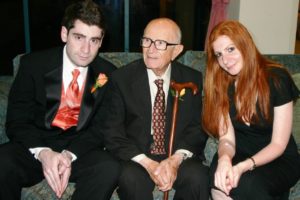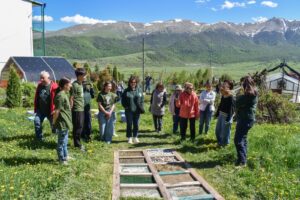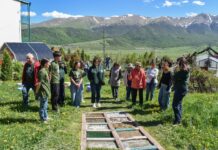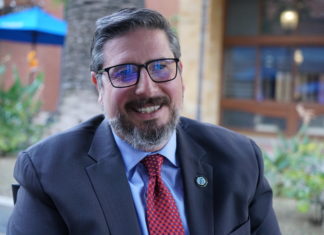
BURBANK, Calif. — On the occasion of Yervant Babayan’s centennial birthday and jubilee celebration, which took place on June 16 in Burbank, his grandchildren, Yervant and Taleen Babayan, shared an open letter honoring their grandfather:
“To everyone else, he was Dnoren Baron Yervant Babayan. To us, he was simply Dedig.
As children, a significant portion of our leisure time was spent in Los Angeles with our grandparents, which left an indelible mark on our youth. From the moment we knocked on their door, fresh off of a flight from New York, we would be greeted with strong hugs and endless servings of yahinov kufte prepared by our grandmother in honor of our arrival.
After waiting in suspense to see who won the grape hidden inside the kufte, we would retreat to the living room where Dedig would settle himself in his armchair. He would patiently listen to our answers as he inquired about school, our activities, and most importantly, what we were learning in shapadoria (Saturday school). Sometimes we would pause for a moment as we searched for an Armenian word. Without missing a beat, Dedig would insert the appropriate word into our conversation. In fact, it was during these impromptu language lessons that we learned more makoor hayren. Before we went to bed, he would test us on our newly acquired vocabulary — zovaspuyr (air conditioner,) zovatzootzeech (cold drink) and our favorite — gentanapanagan bardez (zoo.)
Spending a day with Dedig was similar to taking a journey back in time to a more distinguished and civilized era. After gliding into his suit jacket and giving his silk red tie a final tug, he would take our hands and lead us down the palm tree-lined Everett Street in Glendale. Our first stop would be Alpha Beta — where he would buy us whatever American-themed snacks and cereals our elementary hearts desired (Dedig wanted us to be disciplined, but he was also realistic of our juvenile cravings.) Our day would continue onto Abril bookstore where he would engage in conversation with the late learned owner, Harout Yeretzian, while we would browse the extensive collection of Armenian books ranging from authors of our historical past to more contemporary writers. The illustrated Armenian children’s books would catch our eye and we would look forward to Dedig reading them to us later that night. Our last stop of the day would be at Dedig’s office on Allen Avenue in nearby Altadena. Sitting behind his large oak desk, flanked by bookcases on both sides, Dedig would read through his mail and welcome visitors. Former students, neighbors and relatives would arrive as conversation naturally sparked in relation to local happenings, politics and the growing pains of the then newly independent homeland.
Our evenings would culminate — after more yahinov kufte — with a friendly game of tavloo, or as Dedig also called it, nardi. As we contemplated a move, Dedig would lift his pointer finger up and urge us to think again. After we moved our pieces across the white shell mosaic patterns of the board, Dedig would suggest a different — and more favorable — move for us the following turn. Often we would win, though looking back we are not sure if we truly were the “winners,” or if Dedig wanted his grandchildren to feel a moment of pride. But when we became too excited in victory, or too upset in defeat, Dedig would always remind us: “Haghdutian mech hamesd, bardutian mech vehantsen” (In victory be humble, in defeat be gracious.) The teacher in him was never muted, neither in actions nor in lessons, no matter the situation.
One lesson that remains with us to this day is Dedig’s love of his culture and of his people, which is evident in a lifetime of dedicated service, passed down from his own father, Rev. Nersess Babayan. After studying in Paris to advance his teaching credentials, he had the option of returning to Aleppo to assume a position at the Giligian School or staying in Paris for another teaching opportunity. He chose his people — and that is the same choice he has made throughout his life.
When the Vahan Tekeyan School, an educational institution we had heard so much about in our youth, was in need of leadership during a tumultuous time in its history, Dedig quietly and diligently assumed the positions of teacher and principal. A visit to the school in Beirut, Lebanon a few years ago brought to life the stories Dedig’s students and Dedig himself told us from his forty-year tenure. Although the building was a little more worn and the hallways a little emptier, Dedig’s spirit was still alive. The lessons he had taught to us, his grandchildren, and thousands of other Armenian youth, transcended space and time and were silent ones we learned by watching Dedig’s actions. While we had only caught the tail end of it, we could sense, from a young age that our Dedig had influenced so many people’s lives, shaped them and in a sense, fathered them, at a critical point in our history. The perilous descendants of the Genocide were the inaugural students of the Vahan Tekeyan School and through Dedig’s tireless efforts, he molded them and strengthened them to create a stronger diaspora and in essence, a stronger homeland.
Perhaps that is why, to this day, people still bow their heads just a bit for their former dnoren.”







